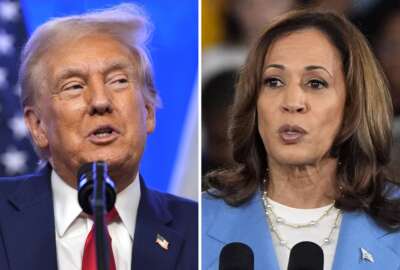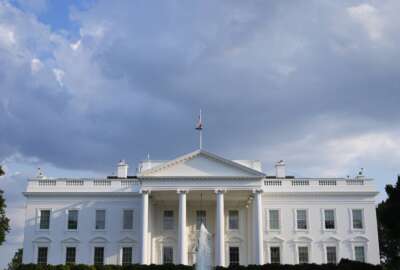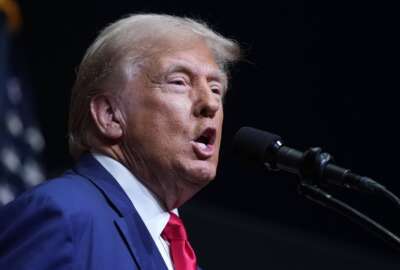Trump campaign’s delays in transition planning pose ‘real risk’
Former President Donald Trump’s transition team has missed multiple deadlines to sign an agreement and begin receiving resources for transition planning.
With former President Donald Trump’s campaign still not accepting the government’s offer of services meant to help with presidential transition planning, good government officials are warning that the continued delays pose a “real risk” to government operations.
To ease the process of moving into a new administration in January, both major party’s campaigns have the option to access resources from the General Services Administration and the White House ahead of Election Day. But so far, Trump’s campaign has missed multiple deadlines to sign a memorandum of understanding (MOU) and begin receiving those resources.
“So much of what they will need in order to be prepared to run our government depends upon having access to information and resources that are dependent upon that MOU with GSA,” Max Stier, the Partnership for Public Service’s president and CEO, told reporters during a press conference this week. “They have more time to get it done, but the clock is running.”
Both campaign transition teams also had an Oct. 1 deadline to sign an MOU with the White House to define the terms of their access to agencies, including personnel, facilities and documents after the election. A Biden administration official said an MOU with Harris’ transition team is in place, and they are “actively working” with the Trump transition team to complete an MOU.
“The federal transition coordinator has engaged both eligible candidate transition representatives to negotiate memoranda of understanding,” the official said in an email statement.
Both Trump and Vice President Kamala Harris previously named leaders for their transition planning teams, which officials at the Partnership said is an important step in the process. But without signing an MOU with GSA, those leaders and their teams will have a harder time getting transition planning work off the ground and running.
Through an MOU with GSA, presidential campaign teams can get access to space, supplies and information ahead of the November election. The idea is to have a solid footing in transition planning ahead of Election Day, making for a smoother transition to a new administration once a winner of the presidential election is determined.
The Sept. 1 deadline for signing an MOU with GSA has come and gone, but Partnership officials said signing an agreement is still important, especially as time runs short before the Nov. 5 election.
“A new president, on day one, will be responsible for addressing incredibly diverse and complicated issues,” Stier said. “You need to have real-time information about what those are, and you need to have people read into them so that they are actually ready to be able to help lead those agencies. There will be a career workforce that will be in place, but for that political team to understand what’s going on, they need that MOU, and they need the time to be able to actually understand that landscape.”
A GSA spokesperson said in an email to Federal News Network that GSA has extended offers of services to both major party candidates and is prepared to begin providing services to the Trump transition team once an MOU is executed. GSA has entered an MOU with the Harris transition team, the spokesperson said, which outlines terms for using federal office space and various resources, such as office equipment, communications and IT services.
What transition planning resources does GSA offer?
According to the Harris transition team’s MOU with GSA, her campaign has access between now and Nov. 5 to 20,000 square feet of office space in D.C., enough to house about 100 staff members. They’ll also be able to get office furniture, equipment, secure laptops and software for their work in planning the transition process.
Through an MOU, GSA can also offer transition teams cybersecurity protections, as well as the ability to identify campaign team members who might need immediate security clearances following the November election.
“You really do want to be moving forward as fast as you can, getting people cleared, so that they are going to actually have access to information that is non-public and classified,” Stier said. “It will be a real problem if they don’t have the MOU in place.”
Under the Presidential Transition Act, GSA also offers a “resume bank” to both transition teams, once an MOU is in place.
“For either candidate, who is in the position to be accepting hundreds of thousands of resumes in the next few months, having something like that established before the election is very useful,” Valerie Smith Boyd, director of the Partnership’s Center for Presidential Transition, told reporters during this week’s press conference.
If the Trump team signs an MOU with GSA, all the same resources will be available to his staff as well. GSA said it offers information and assistance on an equal basis, regardless of party, and separates each team’s spaces both physically, and over IT networks. GSA also assigns separate staff members to support the teams onsite.
Trump’s transition team did not share any details with Federal News Network on when or if there were plans to sign an agreement with GSA, or how far along the team currently is in its transition planning work.
Recent reforms present new challenge for agencies
The upcoming presidential transition will also be different in part because it’s the first election since the passage of the Presidential Transition Improvement Act. The 2022 law made reforms to “ascertainment” — the process that gives the presumptive election winner access to resources and the ability to coordinate with agencies to prepare for an administrative transition.
After GSA delayed support during the 2020 presidential transition, the Presidential Transition Improvement Act changed GSA’s role by requiring an “equitable” release of transition services to both candidates, in the case that there’s not a clear winner immediately after the election. If there is still not a clear winner five days after the election, GSA would have to offer resources to both candidates until there is a clear winner.
But Partnership officials said those reforms also present agencies and career federal employees with a new challenge — the possibility of having the additional work of collaborating with two sets of transition planning leaders, rather than just one. The career federal workforce has been through the presidential transition process many times over, but the changes from 2022 could make the process more cumbersome — especially without enough leg work done ahead of Election Day.
“Federal agencies are doing the hard work of preparing for what may be double the effort that they usually spend in the transition process,” Smith Boyd said.
Right now, both campaign teams “are understandably focused on who’s going to what battleground state,” Stier said. “But the end result here is, who’s going to be actually ready to keep us safe and run our government effectively?”
Copyright © 2025 Federal News Network. All rights reserved. This website is not intended for users located within the European Economic Area.
Drew Friedman is a workforce, pay and benefits reporter for Federal News Network.
Follow @dfriedmanWFED






